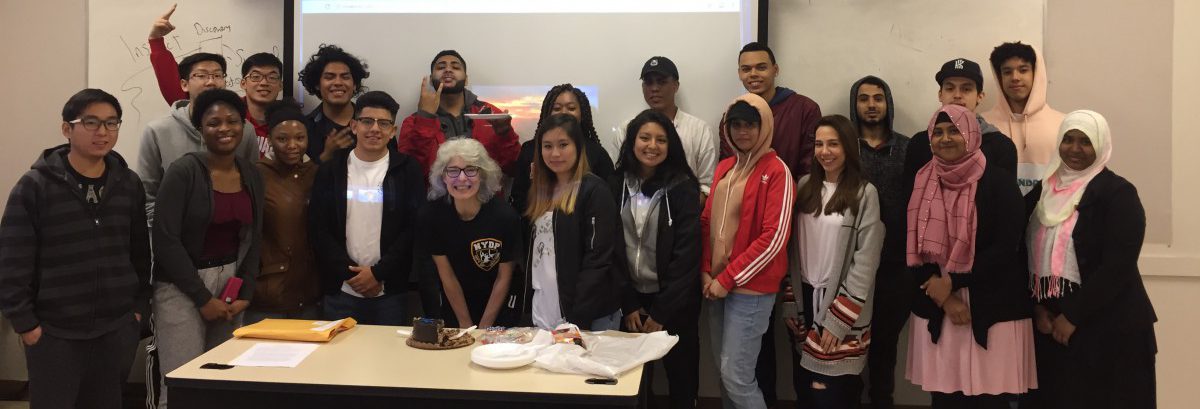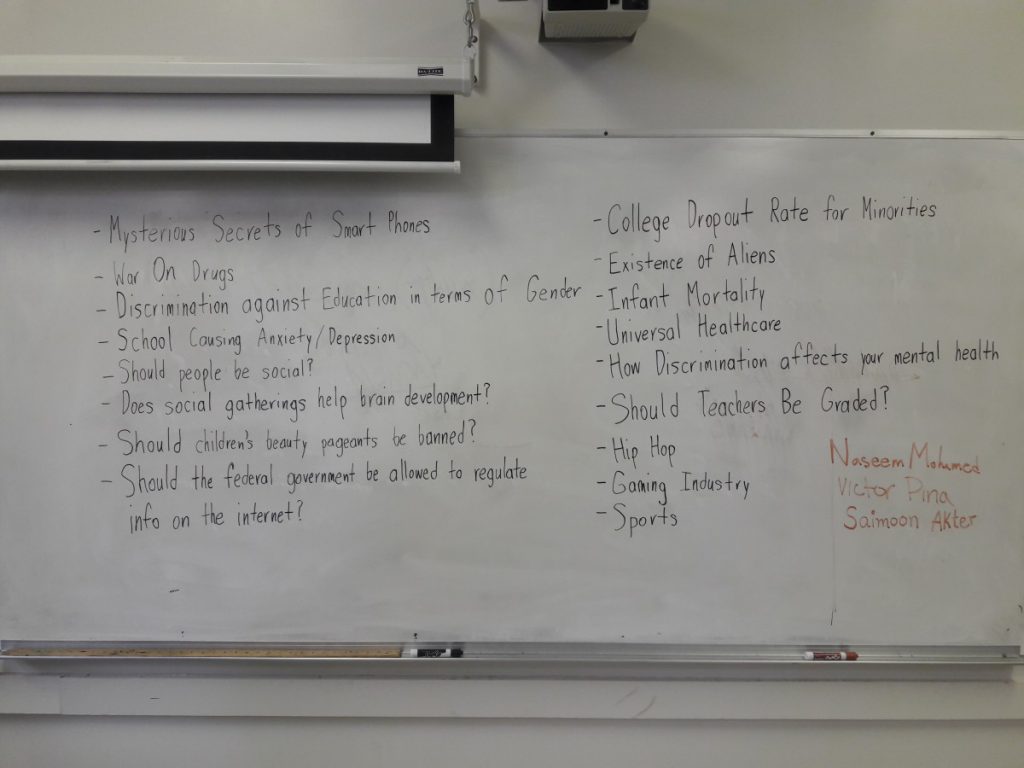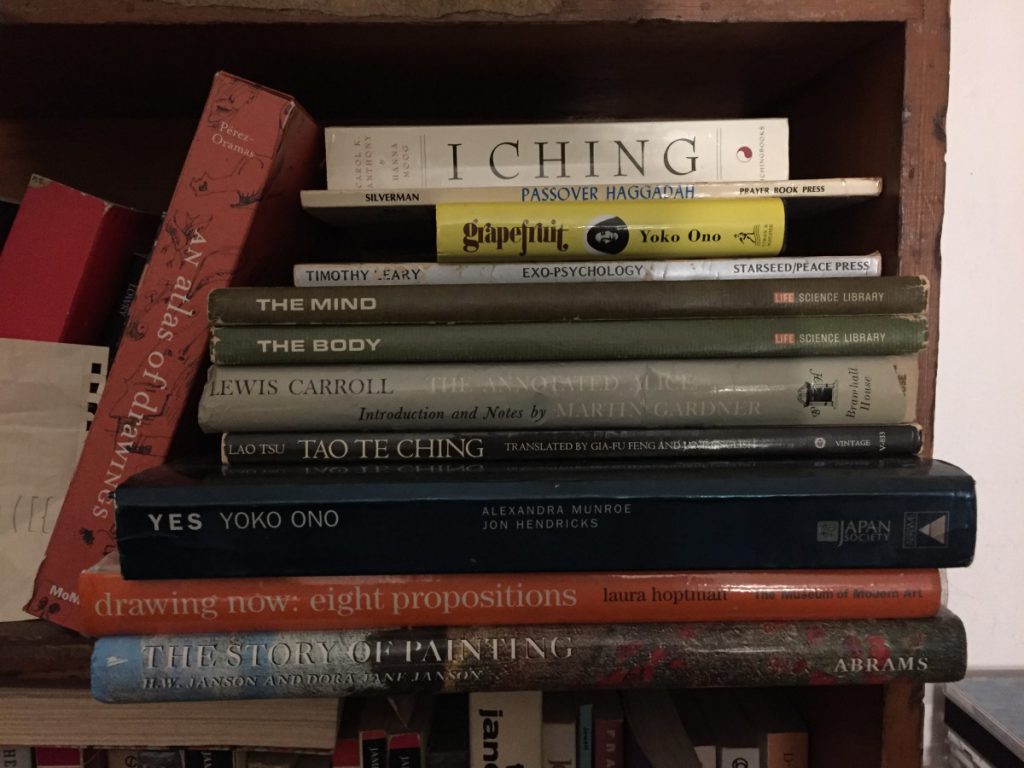More research resources
Open lab owl resources
Mla overview:
https://owl.english.purdue.edu/owl/resource/747/01/
Paraphrasing
https://owl.english.purdue.edu/owl/resource/563/01/
Prof. Roger’s comprehensive resource page:
http://www.digitalcomposition.org/openaccessenglishhandbook
Online resource for research outlining:
Here’s one view on the value of Science and Research
Themes and Topics…
More Scale Issues
A nice video of guys mapping the orbits of the planets in our solar system to scale.
Welcome to Research Paper Land…
As you may recall, class, the last part of the semester is spent on forging and writing a Research Paper. It will be your largest assignment of the semester.
We looked at the Purdue OWL Website in class. I will copy below some of the advice on their website (one link is here, and more given below) to get you in the mood. Your paper’s length will be app. 1,500 to 2,000 words, and it will follow MLA format:
The research paper
There will come a time in most students’ careers when they are assigned a research paper. Such an assignment often creates a great deal of unneeded anxiety in the student, which may result in procrastination and a feeling of confusion and inadequacy. This anxiety frequently stems from the fact that many students are unfamiliar and inexperienced with this genre of writing. Never fear—inexperience and unfamiliarity are situations you can change through practice! Writing a research paper is an essential aspect of academics and should not be avoided on account of one’s anxiety. In fact, the process of writing a research paper can be one of the more rewarding experiences one may encounter in academics. What is more, many students will continue to do research throughout their careers, which is one of the reasons this topic is so important.
Becoming an experienced researcher and writer in any field or discipline takes a great deal of practice. There are few individuals for whom this process comes naturally. Remember, even the most seasoned academic veterans have had to learn how to write a research paper at some point in their career. Therefore, with diligence, organization, practice, a willingness to learn (and to make mistakes!), and, perhaps most important of all, patience, a student will find that she can achieve great things through her research and writing.
This handout will include the following sections related to the process of writing a research paper:
- Genre– This section will provide an overview for understanding the difference between an analytical and argumentative research paper.
- Choosing a Topic– This section will guide the student through the process of choosing topics, whether the topic be one that is assigned or one that the student chooses himself.
- Identifying an Audience– This section will help the student understand the often times confusing topic of audience by offering some basic guidelines for the process.
- Where Do I Begin– This section concludes the handout by offering several links to resources at Purdue, and also provides an overview of the final stages of writing a research paper.
The above is directly taken from Purdue OWL. Are you interested? Do you want to read more? (links are included below, at the end of the post.-ss)
CHOOSING A TOPIC:
The first step of any research paper is for the student to understand the assignment. If this is not done, the student will often travel down many dead-end roads, wasting a great deal of time along the way. Do not hesitate to approach the instructor with questions if there is any confusion. A clear understanding of the assignment will allow you to focus on other aspects of the process, such as choosing a topic and identifying your audience.
Topic
A student will often encounter one of two situations when it comes to choosing a topic for a research paper. The first situation occurs when the instructor provides a list of topics from which the student may choose. These topics have been deemed worthy by the instructor; therefore, the student should be confident in the topic he chooses from the list. Many first-time researchers appreciate such an arrangement by the instructor because it eliminates the stress of having to decide upon a topic on their own.
However, the student may also find the topics that have been provided to be limiting; moreover, it is not uncommon for the student to have a topic in mind that does not fit with any of those provided. If this is the case, it is always beneficial to approach the instructor with one’s ideas. Be respectful, and ask the instructor if the topic you have in mind would be a possible research option for the assignment. Remember, as a first-time researcher, your knowledge of the process is quite limited; the instructor is experienced, and may have very precise reasons for choosing the topics she has offered to the class. Trust that she has the best interests of the class in mind. If she likes the topic, great! If not, do not take it personally and choose the topic from the list that seems most interesting to you.
The second situation occurs when the instructor simply hands out an assignment sheet that covers the logistics of the research paper, but leaves the choice of topic up to the student. Typically, assignments in which students are given the opportunity to choose the topic require the topic to be relevant to some aspect of the course; so, keep this in mind as you begin a course in which you know there will be a research paper near the end. That way, you can be on the lookout for a topic that may interest you. Do not be anxious on account of a perceived lack of authority or knowledge about the topic chosen. Instead, realize that it takes practice to become an experienced researcher in any field.
For a discussion of Evaluating Sources, see Evaluating Sources of Information.
Methods for choosing a topic
Thinking early leads to starting early. If the student begins thinking about possible topics when the assignment is given, she has already begun the arduous, yet rewarding, task of planning and organization. Once she has made the assignment a priority in her mind, she may begin to have ideas throughout the day. Brainstorming is often a successful way for students to get some of these ideas down on paper. Seeing one’s ideas in writing is often an impetus for the writing process. Though brainstorming is particularly effective when a topic has been chosen, it can also benefit the student who is unable to narrow a topic. It consists of a timed writing session during which the student jots down—often in list or bulleted form—any ideas that come to his mind. At the end of the timed period, the student will peruse his list for patterns of consistency. If it appears that something seems to be standing out in his mind more than others, it may be wise to pursue this as a topic possibility.
It is important for the student to keep in mind that an initial topic that you come up with may not be the exact topic about which you end up writing. Research topics are often fluid, and dictated more by the student’s ongoing research than by the original chosen topic. Such fluidity is common in research, and should be embraced as one of its many characteristics.
The Purdue OWL also offers a number of other resources on choosing and developing a topic:
- Understanding Writing Assignments
- Prewriting
- Starting the Writing Process
- Invention Slide Presentation
Here you go (LINKS):
On Getting Started:
https://owl.english.purdue.edu/owl/resource/552/01/
On MLA Style:
https://owl.english.purdue.edu/owl/section/2/11/
Shelf, Expanding
What’s Behind the Concept of “In-Formation”
“In-Formation” Definition:
+The concept of creating a topic that is dynamic and always gathering energy
+The imagining of “self” as being dynamic, under construction–a goal we arrive at after a lifetime of learning and seeking; an ever-expanding center
++++++++++++++++++++++++++++++++++++++++++++++++++++++++++++++++++++++
“In-Formation”‘s Learning Objectives:
Re-think the worth/value/role of the citation page; re-engineer the research paper from back to front; build upon all the hard work we did in 1101; do things better a second time around; find a topic we enjoy and can really sink our teeth into; make finding a Thesis Statement more natural a process
Some Background:
Students were asked, at the beginning of the semester, to show the Professor their final research papers/projects from 1101 (just for information purposes, not for a grade.) At the end of their “In-Formation” assignment, the papers will be given back to the students along with notes on their current “In-Formation” presentation (reflection worksheets will be provided). Students will be asked to reflect on how they might like to do their new research projects differently, given what they have learned.
The Reasoning Behind “In-Formation”:
Freshman Comp is divided into two distinct semesters, and yet, a final research project is assigned in both. Often, students go from one professor to another with little or no sense of continuity or traction (teaching styles and approaches vary). How can I, in 1121, build upon what my (new) students have accomplished after working so hard on their research projects in 1101? How can I help them address their main areas of concern and also reinforce their strengths? How can I make them feel that their work is in fact building towards a greater understanding of the research process? And: Can I give them a chance to do things better, this time around?
Office Hour Cancelled Today (Mar 9) in the Library
Thank you.
Class Cancelled March 8 due to illness
Many apologies.
ss






